At 28, Edward Craven has built Stake.com into one of the world’s biggest gambling enterprises. But there is another side to its hot streak.
When Australia’s youngest billionaire posted a “year in review” message to his blog two days before Christmas, he had quite a bit to cover.
A highlight: the Financial Times profiling his online gambling platform, Stake. A lowlight: North Korean hackers raiding Stake in a multimillion-dollar theft under investigation by the FBI.
But 28-year-old Edward Craven’s main message was one of immense growth. He presented some “cool stats”, perhaps the coolest of which was the total number of bets placed on Stake that year – nearly 66 billion.
“The rocket continues on its journey, and all are welcome,” Craven wrote. “Are you in?”
Fuelled by cryptocurrency deposits, the casino and sports betting site he co-founded in 2017 has grown to become one of the biggest gambling enterprises in the world.
“A money machine,” the Australian Financial Review called Stake last year, estimating Craven’s net worth at $3.1 billion. This was up 183 per cent on the year before, when he dropped $80 million on a derelict Toorak mansion to set a record for Melbourne’s most expensive home.
Major Stake sponsorships have included the Ultimate Fighting Championship, the English Premier League football club Everton and the Formula 1 team Sauber.
Stake’s brand ambassador is no less than Drake, the acclaimed pop star and rapper, who plays roulette on a laptop in a promotional video intercut with footage of dolphins, sunsets and fireworks.
“It’s the biggest player in the field, an absolutely massive crypto casino,” says Brett Abarbanel, executive director of the International Gaming Institute at the University of Nevada, Las Vegas.
But there is another side to Stake’s hot streak. Gambling authorities in a number of countries have blocked stake.com for operating without the legally required licences.
According to chat messages tendered in one overseas court case, a Stake employee told a player who had admitted to betting on fixed matches that he could do a “f-ckkkk load of dodgy betting” before getting in trouble.
The site is also facing a legal claim, arguing that Stake has failed to compensate a series of players, who allege their gambling addictions were exploited with bonuses and VIP attention.
“Stake thrives off people having gambling addictions,” says Fred, 23, one of the players to send a demand letter to Stake. “Everything they do is to get you addicted to the site.”
Stake, whose Australian origins were revealed in The Sydney Morning Herald and The Age in 2021, says it will strongly defend itself against the players’ claims, describing them as “spurious”.
The Sydney-born Craven cannot legally offer Stake casino games on his home soil. But there are signs that Stake is eyeing an expansion into one of Australia’s most polarising pastimes: sports betting.
Stake, the Caribbean and unlicensed gambling
Stake is everywhere and nowhere.
Its customer support is in Serbia, payment processing in Cyprus, and game development in Australia.
Stake, not to be confused with the share trading platform of the same name, declined to reveal where it pays the most tax.
A spokeswoman said in a statement: “We pay our taxes and employ over 300 people at our Australian headquarters.”
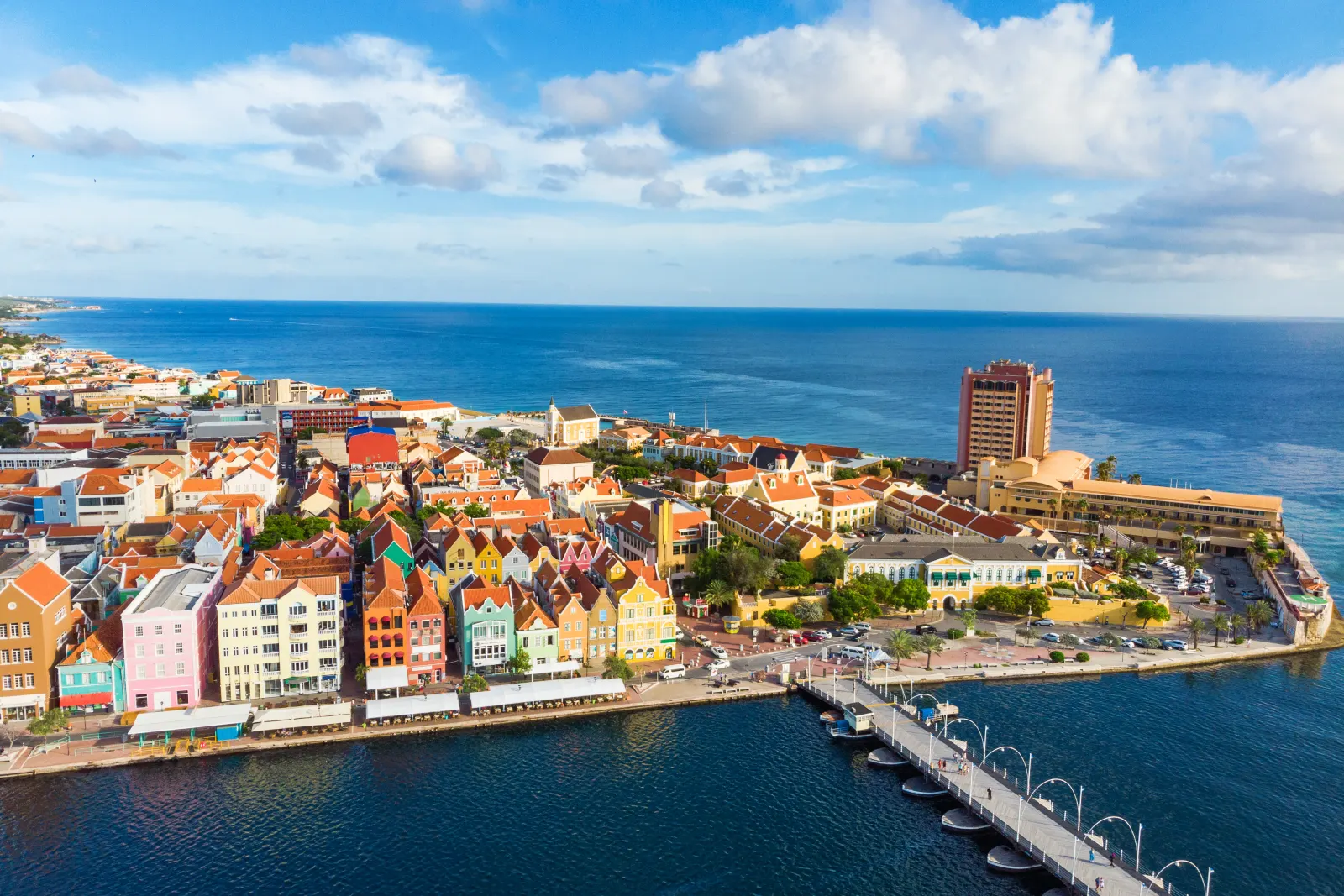
However, the stake.com fine print says the business is “owned and operated” by a company based on the Caribbean island of Curacao, population 153,000.
Curacao, with its relatively loose regulation and oversight, has become a popular destination for online casino operators.
Stake advertises its Curacao licence to customers across the world while geo-blocking users trying to log on from countries including Australia, the United States, and the United Kingdom.
In other countries, Stake has been accused of offering gambling with no licence.
It was one of 49 sites blocked by the Danish Gambling Authority last year for “offering illegal gambling in Denmark”. Spain’s Directorate General for Gambling Regulation fined Stake €4 million in 2022 for operating without the required Spanish licence.
Stake had already come to the attention of French authorities.
On July 13, 2021, a Paris court ordered local internet service providers, or ISPs, to block access to stake.com at the request of France’s National Gambling Authority, as it had no valid licence. Online casino games were illegal in France.
Four days after the French court order, on July 17, Craven chose to spend part of his birthday in one of his regular live-streams addressing Stake users. Audience members left “happy birthday” comments in the chat column as he spoke of how “different countries have different politics”.
Stake co-founder Edward Craven addresses blocks on his gambling platform.
“If for whatever reason, you are unable to access stake.com due to your country’s political views etc, please feel free to use stake.bet, stake.games, or any other official mirror website,” he said in the live-stream, captured on video.
Craven went on to say “some French ISPs are making gambling a little bit more difficult at the moment”. He assured players in France: “We still want you, so you’re still more than welcome to play, you just need to jump through a few hurdles, that’s all.”
Kahlil Philander, an assistant professor at Washington State University who has studied the crypto gambling universe, says providing advice on how to avoid service provider blocks was highly concerning.
“The gambling industry spent a lot of time trying to remediate their image to one that is very respectful of authority and their role within a regulated ecosystem,” Philander says.
“And when you see the leaders of gambling organisations communicate like [Craven did] it’s just not nice to see.”
Asked about Craven’s instructions and France’s legal restrictions, Stake’s spokeswoman said it was “patently obvious” Craven was referring “to the blocking of sites by ISPs”.
“Regulations in France came into force following this live-stream and, in compliance with the new regime, we blocked players from France,” she said. “Our relationship with French authorities is now strong.”
Stake’s spokeswoman said the French, Spanish and Danish findings – from 2021, 2022 and 2023 – were “historical”.
“We stand by our position that we do comply with laws and regulations where we are permitted to operate and respect the same in jurisdictions where we do not have this permission,” she said.
‘This has got out of control’
Whatever restrictions are in place, they have not stopped Stake amassing an international customer base wagering billions of dollars in crypto each year.
They come for sports betting (everything from Twenty20 cricket to ice hockey), casino games with live-streamed dealers (baccarat, roulette and blackjack) and digital pokies (with names like Dark Summoning, Samurai Dogs and Slushie Party).
Slot machines like these drew in Fred, the former player, who requested anonymity fearing that discussing his gambling addiction could hurt his career.
Fred had previously self-excluded from online gambling in Britain when he was 20, before seeing references to Stake in YouTube videos.
“It looked the part,” he says. “Very professional, very fun. They had a huge selection of games compared to other sites.”
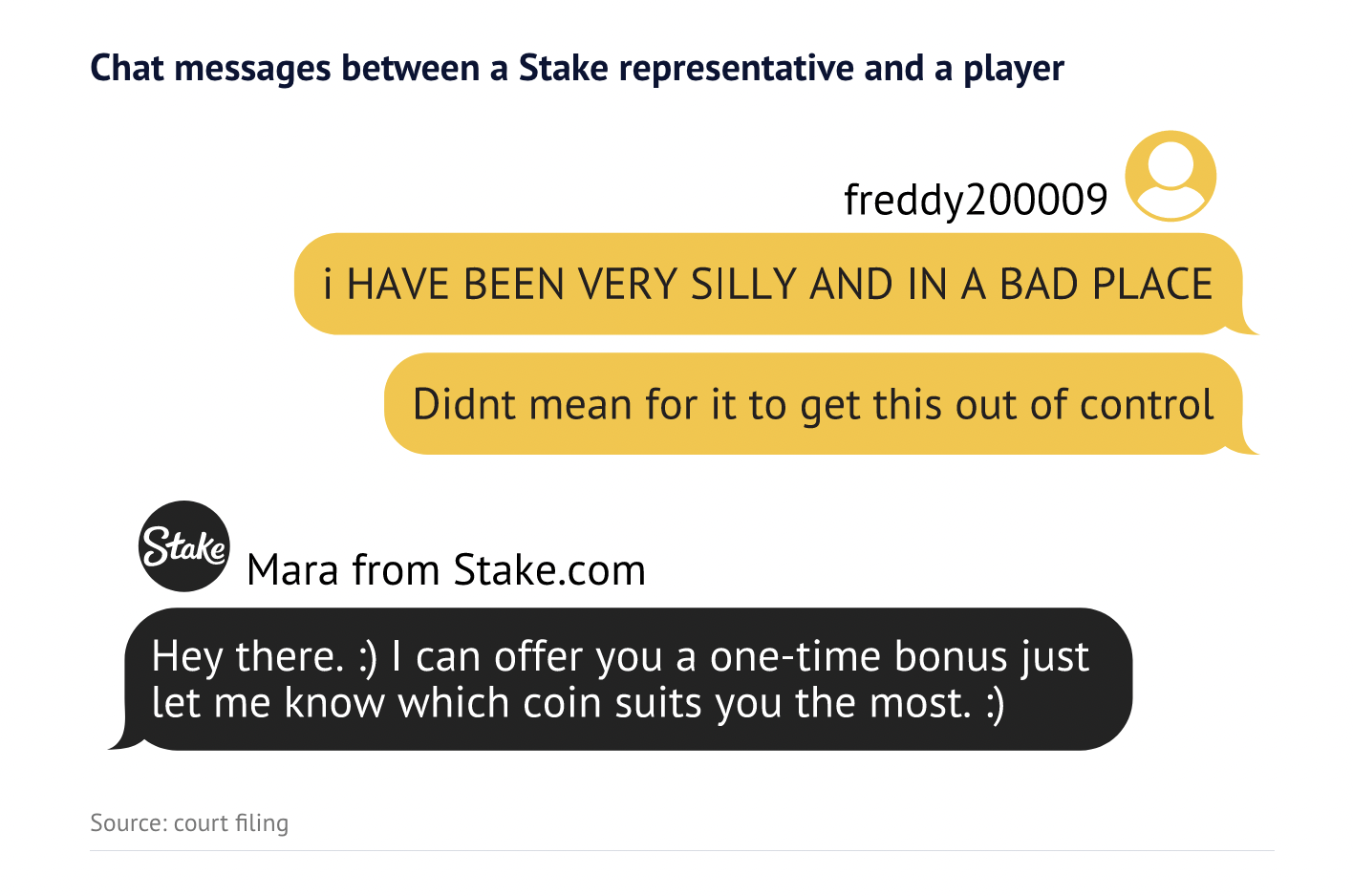
Source: court filing
According to a demand letter his lawyer sent to Stake, Fred signed up to the site in February 2022 using his real name, a fake address and a virtual private network, an app that allowed him to set his location to countries outside the UK.
Using savings, credit cards and personal loans, he poured money into the virtual slot machines for up to five hours a day, he says.
In messages with Stake staff, attached to his legal letter, Fred frequently mentions financial difficulties.
“I have got myself into a bad position and my gambling with your site has got out of hand. Nearly wagered 500,000 in the last 2 weeks,” he wrote.
“Is there anything you guys can do to help reimburse some of my losses. Any help would be greatly appreciated as this has got out of control.”
He added soon after: “i HAVE BEEN VERY SILLY AND IN A BAD PLACE”.
A Stake staff member replied: “Hey there. 🙂 I can offer you a one-time bonus just let me know which coin suits you the most. :).”
Fred pressed again days later: “When does the monthly bonus come in? Lost a lot of money and I am in need of it.”
At the end of the month, Stake congratulated him on reaching Platinum III VIP status, an “amazing tier” that came with “awesome perks”.
According to his legal claim, Fred lost $US34,500 in the three months after he first told Stake he was out of control, and he was only banned after explicitly identifying himself as addicted.
“You are literally just money to them,” he says. “Someone could have easily intervened.”
Fred’s lawyer, Roelof Bijkerk, lives in Curacao and represents players from across the world who allege wrongdoing by the online casinos licensed there.
Last week, Bijkerk launched a legal petition in a Curacao court, arguing Stake has failed to pay compensation claims from five of his clients, including Fred, who have alleged failures of responsible gambling practices by Stake.
“It’s the misuse of gambling addictions and the bypassing of local applicable rules which are established in many jurisdictions to safeguard players,” Bijkerk says.
“That’s what all these cases have in common.”
Stake did not answer specific questions about the players and the chat messages.
“This petition is currently before the court, so it is not appropriate to comment in detail other than to say that we believe the claims made about us to be without merit,” a spokeswoman said.
“It is unfortunate that, as a result of the company’s success, we have faced many unfounded and spurious claims from lawyers exploiting a loophole in Curacao law, which allows lawyers to purchase claims.”
Bijkerk says any suggestion he has purchased claims is “nonsense” and confirmed that none of the five players’ matters had been bought or sold.
‘Make those numbers look prettier’
One of the five players is a 31-year-old from Denmark, who says he has contemplated suicide after heavy sports betting losses on Stake through 2021 and 2022.
The player, who is seeking to recover $US194,000, asked to remain anonymous, saying even family members were unaware of his gambling addiction.
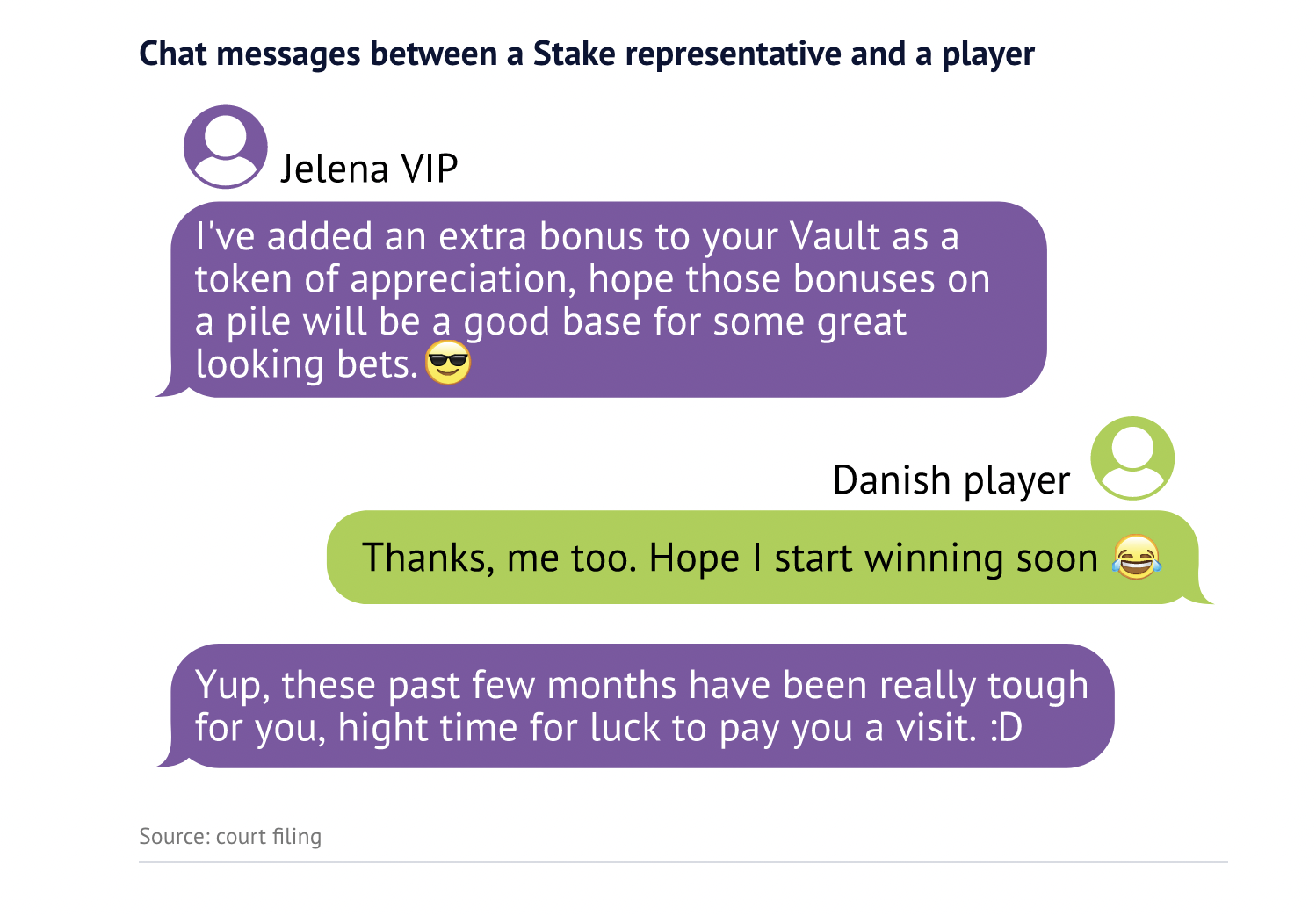
Source: court filing
“Right now it’s just the lowest I’ve ever been,” he says. “It’s because of my financial position, which is because of Stake.”
On the site, he gambled on tennis, Formula 1, hockey, basketball, American football, baseball, table tennis and even esports like Counter-Strike.
He alleges that after his betting increased he was introduced to a VIP host named Jelena, who chatted with him over Telegram in unfailingly cheerful messages that are attached to his legal letter. Sometimes, she would sign off with a four-leaf clover emoji.
“It felt like she was a friend,” the player says.
After he told her he had lost “way more” than his budget and wanted to quit, Jelena replied saying Stake took problem gambling very seriously and provided directions about how to self-exclude.
However, she also offered a way to “alleviate” some of his losses: wait until tomorrow and “there will be a nice bonus ready for you”.
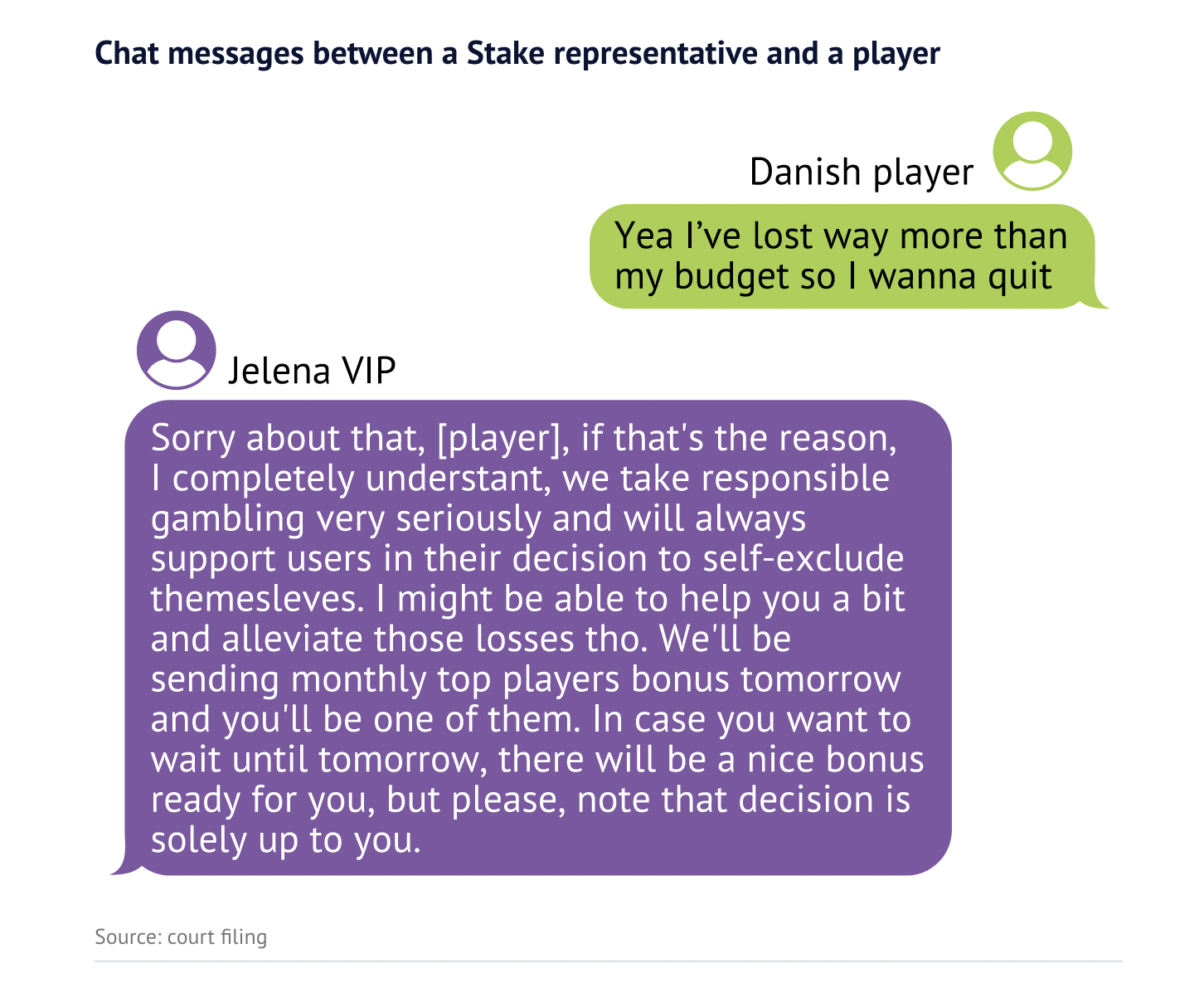
Source: court filing
He kept playing. The player alleges that over the following months his bet limits were increased, and he was sent benefits to his account to keep, as Jelena put it, his “motivation on” during times of heavy losses.
“I still believe you can make those numbers look prettier,” Jelena said at one point, adding a flexed bicep emoji. When the player eventually confronted her, saying she had known about his gambling addiction, Jelena denied she had seen any signs.
A letter from Stake’s lawyers in Curacao said the platform would defend itself and “expressly disputes” the assertions of the players, whose claims had not previously been heard in court.
‘You could bet fixed matches all day…’
Signs that Stake is mulling a move into Australia’s betting scene have shown up in trademark applications.
Since last year, the company has applied to secure Stake Betting, Stake Punt, Stake Sportsbook and Stake Bookie.
The financial media has reported that Stake – which offers bets on a range of Australian sports including NRL, AFL and cricket – is pursuing a sports betting licence in Australia.
Stake declined to comment on where its plans were up to.
Before obtaining a sports betting licence in Australia, applicants must demonstrate they are fit to hold one.
Stake’s sports betting operations have already come under scrutiny in a 2021 court case in Curacao that involved explicit discussions of match-fixing.
A player known as Dag, who was living in the United States, launched the case to recover commissions of up to $US30,000 a month, which he used to receive from Stake for introducing other players to the site.
Stake told the court it stopped paying these commissions after learning Dag had been involved in betting on fixed matches.
According to Dag, he had admitted as much to a Stake employee, months earlier.
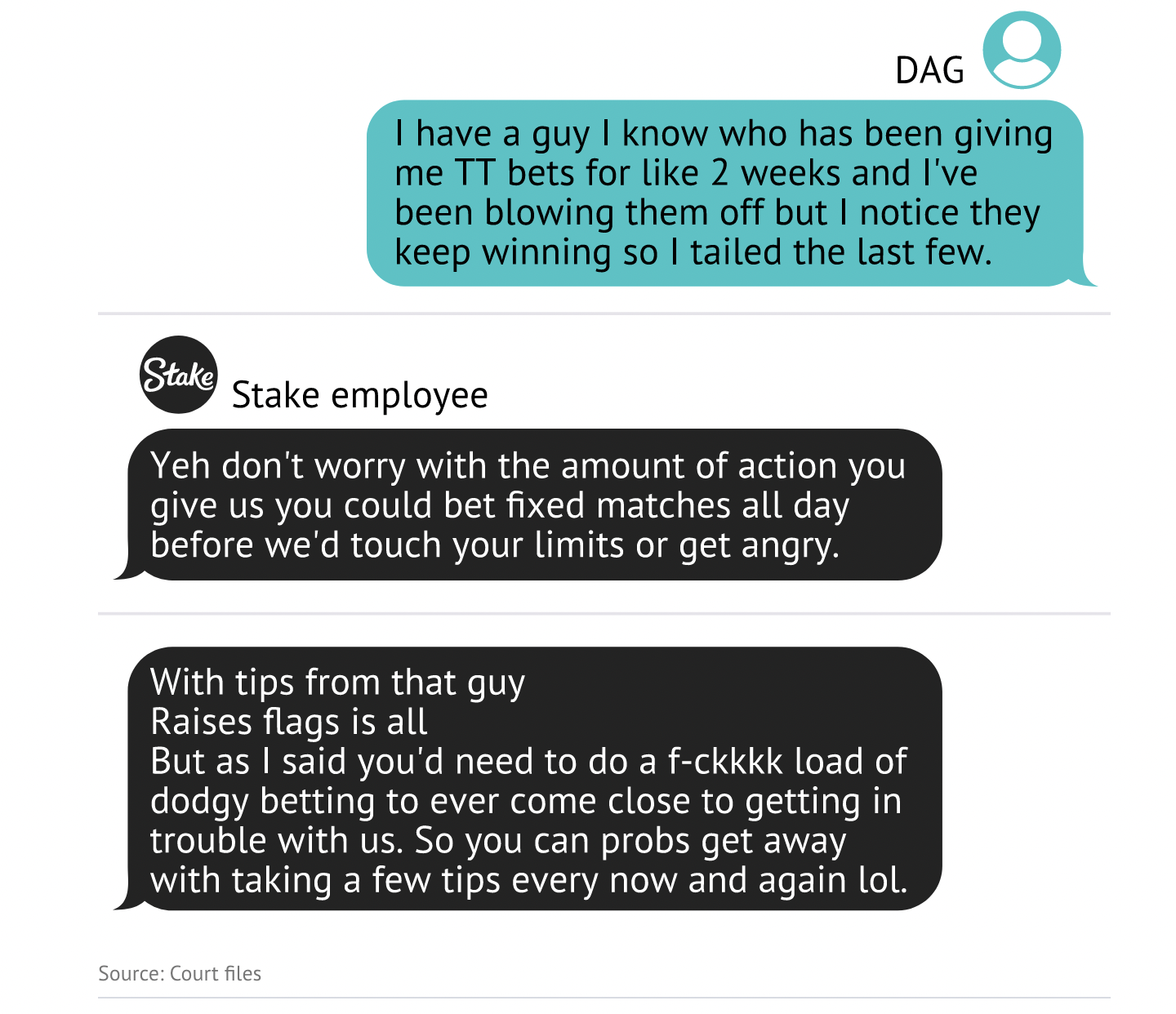
Source: Court files
Excerpts of an online conversation included in the court judgment show the employee replied to Dag: “Yeh don’t worry with the amount of action you give us you could bet fixed matches all day before we’d touch your limits or get angry.”
The employee followed up in another message: “With tips from that guy, Raises flags is all, But as I said you’d need to do a f-ckkkk load of dodgy betting to ever come close to getting in trouble with us. So you can probs get away with taking a few tips every now and again lol.”
Dag kept receiving commissions after these messages. But in a judgment published online, the court rejected his case, finding he had engaged in betting on fixed matches on a larger scale than he had indicated to Stake and that Stake likely had a higher claim against him.

Abarbanel, the University of Nevada academic, says the case would be relevant to a licensing body.
“If you have a site that doesn’t care that somebody is declaring that they’ve placed bets on matches that they know have been fixed, then you have a major flaw in the system,” she says.
“In essence it’s encouraging match fixing, rather than trying to combat it.”
Philander, from Washington State University, says: “Obviously, that’s not something that’s acceptable and it just doesn’t belong anywhere near a well-regulated market.”
Stake’s spokeswoman said the match-fixing case was resolved entirely in Stake’s favour and the business was awarded costs.
“To be clear, Stake does not condone or facilitate betting on fixed matches on our platform,” she said. “It is obviously not in our interests to permit gambling on fixed matches. Any suggestion that our staff are facilitating betting on fixed matches is incorrect.”
As for the identity of the employee who wrote the messages to Dag – and whether they were still employed – Stake declined to comment.
While Stake didn’t outline its plans for Australia in response to written questions, Craven was more open during a live-stream on Saturday as he played a Stake slot machine game.
“Eddie when can Aussies play Stake???” one viewer asked in the chat column.
Craven responded that unfortunately there was no timeline but “we’d love to have Stake in Australia”.
“Hopefully it comes along,” he said. “Aussies just love gambling, right?”
National Gambling Helpline: 1800 858 858.
Crisis support is also available from Lifeline (13 11 14 and lifeline.org.au), the Suicide Call Back Service (1300 659 467 and suicidecallbackservice.org.au) and beyondblue (1300 22 4636 and beyondblue.org.au)
Bron: Sydney Morning Herald
Naschrift KKC
- De illegale sublicentie arresten van de Hoge Raad vindt u hier en hier
- De illegale sublicentie adviezen van de Hoge Raad vindt u hier en hier
- De illegale sublicentie vonnissen van het Gemeenschappelijk Hof van Justitie vindt u hier en hier
- Illegale sublicentie vonnissen van het Gerecht in Eerste Aanleg vindt u hier, hier, hier en hier.
Lees ook: Curacao.nu | Curaçao verlengt onrechtmatig gokvergunningen
Lees ook: Curacao.nu | Geen van de ‘masterlicentiehouders’ op Curaçao heeft een geldige vergunning
Lees ook: Follow The Money: Cryptomiljarden en illegale goksites: ‘Russisch’ 1xBet verovert vanuit Curaçao de wereld
Lees ook: Blog Koninkrijksbelangen | Malafide trustbazen over misbruik van trustvergunningen voor illegale online goksites.
Lees ook: Blog Koninkrijksbelangen | First Lady over innige banden tussen politici en de georganiseerde misdaad.
Lees ook: Blog Koninkrijksbelangen | Masterlicenties over de illegaliteit van Curacaose online gok masterlicenties.
Lees ook: Blog Koninkrijksbelangen | Sublicenties over de illegaliteit van Curacaose online gok sublicenties.
Lees ook: Koninkrijksbelangenblog | Witwaswalhalla over witwassen met behulp van een niet op de wet gebaseerde en niet door de overheid gereguleerde online gambling masterlicentie – sublicentie structuur.
Lees ook: Koninkrijksbelangenblog | Waar zijn de miljarden van Curacao? over belastingontduiking met behulp van een illegale en ongereguleerde online gambling masterlicentie – sublicentie structuur.
Overzicht: het Curacao Goksector dossier
Verdieping: De Koninkrijksbelangen blogserie
